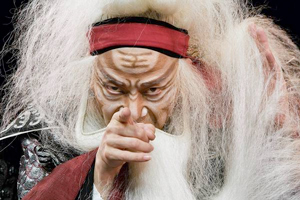by Mike Telin
The
Known for his movie roles as well as for his adaptations of Western classics, Wu Hsing-Kuo began his training in classical Beijing Opera at the age of 11 at the Fu-Hsing Chinese Opera School in Taiwan where he specialized in male martial arts (wu sheng). He went on to attend the Theatre Department of Chinese Cultural University in Taipei where he studied under master Chou Cheng-jung (Zhou Zheng-rong).
We corresponded with the engaging and dryly humorous Wu Hsing-Kuo via e-mail, and began by asking him how he describes Beijing Opera’s acting style? (Throughout his correspondence, Wu Hsing-Kuo used the title “Peking Opera” instead of “Beijing Opera.”)
Wu Hsing-Kuo: The all-around theatre centering on actors does not require too many decorative scenes, gorgeous costumes or beautiful masks. Still, it can form incredibly aesthetic visual space. Vacuum is everything. Spontaneous expression is the most powerful weapon of Peking opera. As one can visualize the mountain and water, as the player leaps in a single bound, he crosses over the hell and heaven.
The categories of roles, both male and female, represent different kinds of people. Each features charming singing, reciting, acting and fighting as the secret skill is staged in performance. Of course, one must start at 10 years old. The master will tell you cruelly how much talent you carry, how long it takes to learn to act, and whether the Granddaddy of the Theatre grants you the career in performing arts.
Cleveland Classical: When did you first discover Shakespeare?
Wu Hsing-Kuo: As an actor of traditional Peking opera, I was keenly aware of the decline of traditional Chinese opera. And I began thinking seriously how to integrate traditional Chinese opera with modern theatre. Thus I founded Contemporary Legend Theatre (CLT).
Adapted from Shakespeare’s tragedy Macbeth, The Kingdom of Desire—CLT’s first play—sought to fuse the singing, acting, reciting, and acrobatic fighting of traditional Chinese Opera with Western canons, and presented the performance in theatre forms. The performance successfully subverted the playgoers’ recognition of Peking Opera and created a totally new aesthetics of Eastern theatre.
In 1990, the work was staged four times in a row at the National Theatre in London. In 1998, it appeared again in the Avignon Festival in France. In 2005, it traveled all the way to California and next year, it will tour again to East Europe.
CC: What do you enjoy most about the character of Lear?
Wu Hsing-Kuo: I am fond of each and every role in Lear. I love the clown, three daughters, Gloucester and his son, even the dog. I dislike most Wu Hsin-kuo, the arrogant, crazy and spoiled actor. The most enjoyable character to me is the clown who pleases the audience. I am most touched by the scene in which Gloucester and Edward meet without recognizing each other.
CC: You were awarded a Fulbright in 1992 to study with Richard Schechner. What did you learn from that experience?
Wu Hsing-Kuo: In Schechner’s course, I was surprised to see how he discussed Indian and Indonesian dancing on Bali Island with graduate students. I thought he would be teaching Vsevolod Emilevich Meyerhold or Jerzy Grotowski. He also invited me to conduct a demonstration on Peking opera in class. Meanwhile, he analyzed the cultural message of the motion in various angles. It established my confidence. I thus discovered that towards the end of the 19th century, western playwrights, directors, choreographers and actors all began their explorations of Asian performance and combined them with their creative ideas.
“Opening the door,” as stated by Peter Brooks, Schechner gave me my first key. Then in 1995, I invited him to Taiwan to serve as director for our adaptation of Oresteia. He courageously blended the forms of Peking opera and that of the Site-Specific Theatre. It created tremendous impact and brought very powerful performance training to our acting members.
CC: In an interview with Alexander C.Y. Huang in 2004, you said “I believe that a combination of Western classics and jingju (Peking opera) acting would benefit the development of jingju theater in a fast-changing age.” Do you feel this has happened?
Wu Hsing-Kuo: Yes, indeed. In Taiwan or China, drawing on Shakespeare in 1986 was a rebellion. Again and again, I bravely break the taboo. Now, more and more theatre companies in Taiwan and China have borrowed from Shakespeare. The most important thing is that the audience buys such cross-cultural combinations. After all, the world is becoming flat. Globalization facilitates the mutual influences between cultures. CLT, starting from Shakespeare, has infinitely imaginative space that is even freer. Later on, we adapted Greek tragedy, Waiting for Godot (Samuel Beckett), Chekhovian musical, and Metamorphosis (Franz Kafka).
CC: Is there anything you would like to tell us about the production?
Wu Hsing-Kuo: This time, I am invited by the Cleveland Museum in America, which is my first invitation from a museum. We are extremely flattered by the privilege. It is my sincere hope that through this special honor, we can attract audience from a variety of backgrounds and different ethnic groups.
Click here to comment on this article. All comments will be moderated by the editorial staff.
Published on ClevelandClassical.com January 22, 2013
Click here for a printable version of this article.



